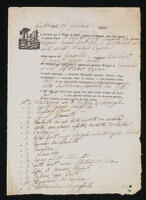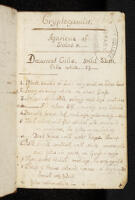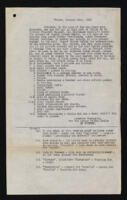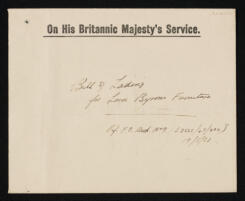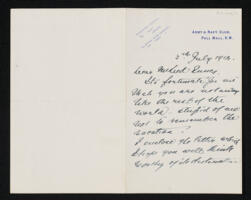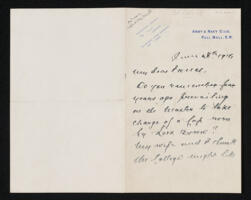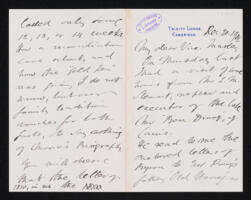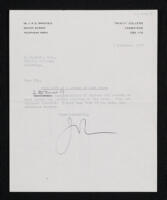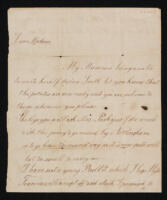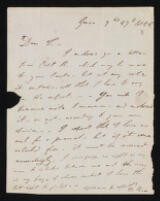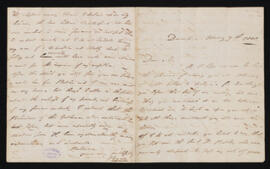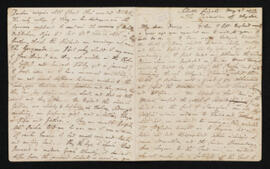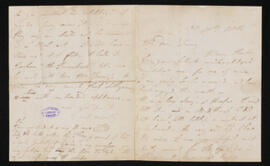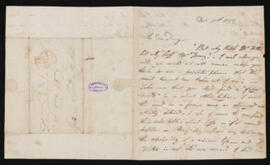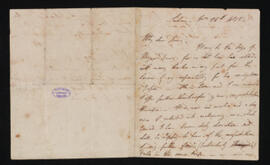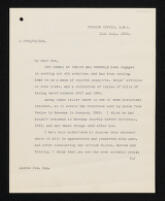On the spine is stamped: ‘MILTON'S ODE AT A SOLEMN MUSIC, SET BY C. HUBERT H. PARRY.’
Stamped on the spine, in the spaces between the bands: ‘MUSICAL | COMPOSITION’, ‘STANFORD’, ‘AUTOGRAPH MS.’, ‘1911’. The prefatory note is dated Apr. 1911.
Venice.—Certifies that R. B. Hoppner, the British Consul, has embarked, on Lord Byron’s account, certain goods aboard the Divina Providenza, bound for Ravenna.
On the fly-leaf are some lines of poetry partly pencilled and then inked over, partly in ink originally. On the fly-leaves at the other end are further fragments in ink and pencil, and one is headed: ‘Plan of a Poem. The Seasons. | Spring. The Visitation, &c.’ Other verses in pencil are on blank pages in the body of the volume, which consists of botanical notes, predominantly on fungi. At the other end is the date 23 Sept. 1793.
Crabbe, George (1754-1832), poet and Church of England clergyman(It is unclear whether this accompanied the bill of lading from Venice, or whether it was made in England by Gaselee himself or someone else.)
—————
Transcript
Venice, January 26th, 1820.
Embarked, in the name of God and under good auspices, one {1} and for all in this port of Venice by Mr. Richard Belgrave Hoppner, His Britannic Majesty’s Consul for account of Signor Milord Bajron, in the hold of the sailing ship named Divina Provvidenza, owner Francesco Ceolin, Austrian, to convey and consign in this present voyage, to the said Signor Milord Bajron the undermentioned and numbered goods, dry, entire, and well conditioned and of the numbers stated: and so the said Master promises to consign them on his safe arrival; and as freight there shall be paid to him in all eighteen Roman crowns, Crowns 18, and in proof thereof this, together with other similar (copies) shall be signed by the said Master, and if he shall be unable to write, a third person shall write for him, and only drawn up, the others being of no value.
No. 4 Mattresses, with 3 pillows and bolster.
” 1 Small padded bed cover.
(a) 2 Empty mattress cases.
(b) 4 Comodes—packed in matting
2 Footstools
1 Basket with various effects, covered in cloth.
1 Valise.
1 Bundle containing a bracket and other effects packed in matting.
1 Dining-room table.
1 Small table.
1 Filter.
4 Cases of printed books.
1 Case containing a plaster Statue.
(c) 1 Sofa of cherry wood.
4 Cushions for the above.
(d) 16 Small walnut chairs.
6 Small straw-seated arm chairs.
1 Caldron containing various effects.
2 Small wooden dog-kennels.
1 Bath tub.
(e) 1 Package containing a double bed and a small child’s bed, taken to pieces.
Lodovico Barbaglia,
for the Master Franco Ceolin as witness.
Notes:—
(a). It was usual at that time to stuff mattress cases with straw—hence the word “Pagliazzo”—(paglia—straw)—presumably the servants’ mattresses.
(b). Como stiorati—the latter word is probably derived from stiora or mat, and possibly they were cov-ered in matting. “Stiorati” a term which is used locally for “inlaid”.
(c). Sofa di Cevesar—this word is evidently Cereser—or the local dialect for cherrywood.
(d). “Careghe”, diminutive “Careghino”—Venetian for a chair.
(e). “Cocchietta”—mispelt† for “cocetta”—double bed. “Putello”—Venetian for child.
—————
1 single sheet.
{1} A slip for ‘once’?
{2} ‘aj’ possibly typed over other letters.
† Sic.
(Transcript made by J. A. Busfield in 1872 (see No. 11). Date supplied by Marchand.)
Label inside front cover, "a. The Philosophy of the Progressive [Sciences], Introduction, Philosophy of the Pure Sciences".
(The envelope bears the printed words ‘On His Britannic Majesty’s Service’, and is labelled ‘Bill of Lading | for Lord Byrons Furniture | Ref. F.O. Desp. No 9. (L2523/43/402) | 19/5/32.’ This is presumably the envelope in which the bill was sent from Venice.)
Army and Navy Club, Pall Mall, S.W.—Sends the letter mentioned in his previous letter (R.2.40A/17), with a donor’s card from his wife.
—————
Transcript
Army & Navy Club, Pall Mall, S.W.
3rd. July 1912.
Dear McLeod Innes.
Its fortunate for me that you are not away like the rest of the world—stupid of me not to remember the vacation!
I enclose the letter which I hope you will think worthy of its destination
My wife is not sure if she sent a donor’s card with the cap; so I enclose one, as its use will gratify her, and it will serve for both.
Yours sincerely,
C. F. Call
Army and Navy Club, Pall Mall, S.W.—He and his wife propose to present to the College a letter from Byron to Trelawny (R.2.40A/10), to be put with the cap sent four years earlier.
(The cap is still in the College’s possession.)
—————
Transcript
Army & Navy Club, Pall Mall, S.W.
June 28th. 1912 {1}
My dear Innes,
Do you remember four years ago prevailing on the Master to take charge of the Cap worn by Lord Byron?
My wife and I think the College might like to possess and place with it, a characteristic letter from the poet to Trelawny.
I hope all is well with you & yours, our kind regards to Mrs. Innes
I have not forgotten having tea with her on the bowling alley green
Yours sincerely,
C. F. Call
—————
McLeod Innes has written at the top, ‘Ans[were]d 1.vii.12 | confident College delighted’, and another person has added in pencil, ‘Col. Call’s gift’.
Transcript
My dear Sir
I forgot to add to the List the following caution which you can insert—
“Never attempt to move antiquities, &c, by means of a firmaun from Constantinople. The only effectual mode of proceeding is by bribing the local Governors, called Aghas, Waiwodes, &c.”
——————————
You are very kind to offer to execute commissions for me. I shall be much obliged to you to enquire if Lusieri, at Athens, received the Thermometer, &c, which I sent to him by Lord Byron’s Servant.
Also to ascertain, by your own testimony, the truth or falsehood of this assertion which I have constantly made; viz. that the Boccaz of Samos, and the Island of Patmos, may be seen in very clear weather from the top of Mount Hymettus.
If you should want a common Greek Servant and Interpreter, you would find Antonio Manurâchi who lives at Constantinople to be quite a treasure. He understands collecting Medals, Plants, Marbles—is a very good Cook, Musician, &c, &c.—
I think you should also insert in your List one more Memorandum—namely
“To attend to the remains of the painted gothic style of Arch in the Levant, and ascertain the age of any such building”.
I have sent a short note for Lord Byron.
Most truly yours
E. D. Clarke.
Trumpington
July 11th 1813.
—————
No direction or marks of posting.
Transcript
Trumpington July 26. 1813.
My dear Sir
The Answer to your Letter may be comprized in very few words.
The route by Azof, or rather Taganrog, to the Caspian, might conduct you with all possible ease to Tarky (Terky) near Derbent (Derbend) upon the frontier of Persia, where you would find my old friend Orazai to whom I could give you a Letter. (See my first Vol. P. 47. second Edit.) {1} But I should, for myself, by much prefer the route through Asia Minor. It has, as you say, been often passed—but we know nothing of it—either of its antiquities, natural history, statistics, or anything else.—The other route is all among Scythians—upon my life you will not like it!—There is not a single object of interest or information the whole way—it is all one flat, melancholy, unwholesome region of nothingness—Russi—inter Christianos Βαρβαρωτατοι.—
Pray add the following to your List of instructions for Turkey.
1. Never attempt to move or to obtain Antiquities &c, &c, by means of a firmaun—do all these things by bribing the local Aghas, or Governors, with trifling gifts—a pair of cheap Pistols—a pocket telescope—a pocket knife—a razor—&c, &c.—your highest bribe must be a Watch with Turkish figures, worth in London about 4£ {2}.—
2. Dig upon the Site of the Temple of Bacchus at Naxos.—
3. Arragonite, worth ten Guineas a Specimen was found by me in the Grotto of Antipasos—Tennant is now employed in its analysis—I mistook it for common Stalactite of carbonated Lime. The interior of those Stalactites are radiated and sparry like this [There follows a sketch of a stalactite.] Pray attend to this—it is of some importance. Tennant made the discovery in my Lecture Room. Those Stalactites are white as snow—and may be from two inches, to two feet in diameter. You cannot bring home a more interesting specimen for natural history; as affecting the origin of the rarest mineral we have, and the only Anomaly in Hauy’s theory of Crystallization. Remember me most particularly to Lord Byron. Tell him I never can keep a copy of his poems one instant in the House. The Giaour is universally in favour[.] Send [me] {3} home some lumps of common Parian Marble from the old Quarry—mere lumps of the size of your head—for the Lecture. Also of the Pentelican from Athens—and pray ask if Lusieri has received my little present, by Lord Byron’s Servant.
Yrs truly
E. D. Clarke.
Tennant desires me to add that he wishes you would leave word at his rooms in the Temple how long you continue in Town?
[Direction:] William Clark Esqr | to the care of the | Lord Byron [In the bottom left corner:] 36 Craven St
—————
{1} Travels in Various Countries of Europe, Asia, and Africa, vol. i (2nd ed., 1810). The page number should be 49, where a description of Orazai begins.
{2} The pound sign is written above the figure.
{3} The paper is damaged here slightly.
Trinity Lodge, Cambridge.—Encloses six letters (2–7) written by Lord Byron to Henry Drury, which have been bequeathed to the college by the son of the recipient.
—————
Transcript
Trinity Lodge, Cambridge
Dec. 20. 1902
My dear Vice-Master,
On Thursday last {1} I had a visit of some hours from Mr L. M. Stewart, nephew and executor of the late Mr “Ben Drury,” of Caius {2}.
He read to me the enclosed letters of Byron to Mr Drury’s father, “Old Harry” as he was called at Harrow, a Son of Dr Joseph Drury the Head Master.
He left out one sentence in one letter about the Turks, which he told me was disgusting {3}, and I have not seen it.
The letters date between 1807 {4}, when the Hours of Idleness were published, and 1815 soon after Byron’s Marriage.
As there are numerous references to my Father, it may be well just to point out that my Father succeeded Dr Drury at Easter, 1805, and that Byron left the School that summer, i.e. I suppose, at the end of July. Consequently, their relation as Master and Pupil lasted only some 12, 13, or 14 weeks. How a reconciliation came about, and how the “gold pen” was given, I do not know, but our family tradition vouches for both facts, to say nothing of Moore’s Biography.
You will observe that the letter of 1810, in wh. the {5} reference to the “gold pen” occurs, describes the famous swim from Sestos to Abydos, and adds—what I had either not known or forgotten—that the swimmer had made a previous attempt which failed.
May I ask you and Dr Sinker kindly to take Charge of the letters, which Mr Benjamin Drury bequeathed to our Library, and to consider where and in what form they may best be kept. The fact that they are a bequest should be specially recorded.
Perhaps it might also be recorded that Dr Joseph Drury, the Grandfather of the Testator, was himself a Trinity man. His Son, “Old Harry,” to whom Byron wrote the letters, was at Eton and King’s.
I am, my dear Vice-Master,
Most truly yours
H. Montagu Butler
—————
2 folded sheets.
{1} The 18th.
{2} Benjamin Drury’s sister Emily (1813–1902) married Stewart’s father, Lestock Wilson Stewart (1824–1876), an army doctor, in India in 1852.
{3} See the letter of 3 May 1810 (R.2.40A/4). Stewart may well have omitted more than one sentence.
{4} The earliest of the letters (R.2.40A/2) in fact dates from 13 January 1808, but it was misdated 1807.
{5} ‘1810’ struck through.
Trinity College, Cambridge.—Sends two letters relating to a letter of Byron given to the College in 1912 (R.2.40A/10).
—————
Transcript
Dr J. R. G. Bradfield, Senior Bursar, Telephone 58201
Trinity College, Cambridge, CB2 1TQ
9 November, 1970
P. Gaskell, Esq.,
Trinity College,
Cambridge.
Dear Pip,
1912 Gift of a letter of Lord Byron
In the course of {1} reorganization of various old records we came across two letter relating to the above. They are enclosed herewith. Please keep them if you wish, but otherwise destroy.
Yours sincerely,
JB {2}
—————
Typed, except the initials and a correction.
{1} ‘In the course of’ above ‘Continuing’, struck through.
{2} The initials are indistinct.
Newstead Abbey.
Genoa.
Dorant’s Hotel, (Albemarle Street, London).
(Misdated 1807.)
Dorant’s (Albemarle Street, London).
Salsette frigate, in the Dardanelles off Abydos.
(Place of writing not indicated.)
(Place of writing not indicated.)
Seaham, (Co. Durham).
(The direction, which is not included in the text printed by Marchand, is ‘— Clarke Esqre | 36 Craven Street’. There are no marks of posting.)
(The direction, which is not included in the text printed by Marchand, is ‘To Dr. W. Clarke | Trin. Coll. | Cambridge’, with ‘1813 | London Novr. twenty seventh’ above, and ‘Byron’ in the bottom left corner. There are no marks of posting.)
(There is no direction, nor any marks of posting.)
(The direction, which is not included in the text printed by Marchand, is ‘Dr. Clarke | 36 Craven Street’. There are no marks of posting.)
(There is no direction, nor any marks of posting.)
Foreign Office, S.W.1.—Presents to Trinity College a bill of lading for the shipping of Lord Byron’s furniture, discovered among the archives of the British Consul at Venice.
—————
Transcript
FOREIGN OFFICE, S.W.1.
21st July, 1932.
L 3720/43/402.
My dear Gow,
Our Consul at Venice has recently been engaged in sorting out old archives, and has been sending home to us a mass of expired passports, ships’ articles or crew lists, and a collection of copies of Bills of Lading dated between 1817 and 1823.
Among these latter there is one of some historical interest, as it covers the furniture sent by Byron from Venice to Ravenna in January, 1820. I think he had himself returned to Ravenna shortly before Christmas, 1819, and had these things sent after him.
I have been authorised to dispose this document where it will be appreciated and preserved with care, and after considering the British Museum, Harrow and Trinity, I think that you are the most suitable people to {1} have it, if you want it.
I enclose a translation of it so that you may see its nature {3}. I think the last item the “small child’s bed” is rather pathetic as it doubtless belonged to little Allegra, who had been ill just before they left Venice.
I do not know whether you will find it necessary to consult anybody else before accepting this offer. I presume your Council does not meet in the long vacation, nor your Library Committee, but you can doubtless speak to the Master or Vice-Master about it, and if you tell me that you would like it, I will send it by registered post or bring it with me some week-end when I come to Cambridge.
Yours ever,
Stephen Gaselee
Andrew Gow, Esq. {2}
I feel that if it went to Harrow it might set the boys asking “But why did the poet go from Venice to Ravenna?”
—————
Typed, except the signature and the postscript.
{1} Typed as a catchword at the foot of the first page and repeated at the beginning of the next.
{2} Typed at the foot of the first page.
{3} It is unclear whether the translation accompanied the bill from Venice, or whether it was made in England by Gaselee himself or someone else.
Transcript
South Cave Yorkshire
March 25th, 1872
Dear Sir,
My cousin, Mr J. A. Busfeild who now tenants Upwood, has discovered a short autograph letter of Lord Byron, and has sent me a Copy which I forward to you. From its brevity I fear it will hardly answer your expectation[,] but at least you may like to know what was its natur[e] and purport
Believe me
Yours very faithfu[lly]
W Busfeild
[Docketed, by Clark:] March 25. W. Busfeild | Byron’s letter.
—————
The back leaf of the sheet has been torn away, and the ends of a couple of lines are missing.
Transcript
South Cave | Brough | East Yorkshire
March 18th, 1872
Dear Sir,
I should have been glad had it been in my power to put you in the way of obtaining for publi-cation the autograph letter of Lord Byron which you say that your father, the late W Clark Rector of Guiseley, presented to my Aunt, Mrs Busfeild of Upwood. She has been dead now thirty three years; but in her life-time I never heard her mention the being in possession of such a letter, nor have I the remotest idea of what has become of it. I have caused a diligent search to be made, but all in vain.
With much regret for your disappointment,
Believe me
Yours faithfully
W Busfeild.
[Docketed, by Clark:] March 18. 1872 | Mr Busfeild—on Ld Byron’s letter


